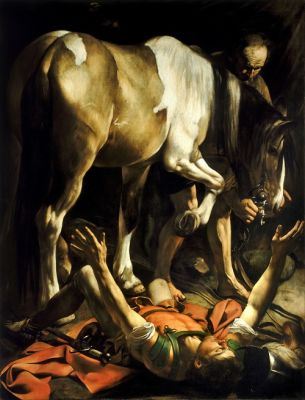Saul was a good Jew. He defended his faith, often to the extreme of persecuting others, as we know.
 As such, he must have been strong, if not merely strong-willed. He also made tents.
As such, he must have been strong, if not merely strong-willed. He also made tents.
By the time he had grown to be a man, he must have figured that this life of his was exactly where God wanted him to be. Don’t we all feel this way? Or at least don’t we all hope that we are doing God’s will at that very moment?
At this very moment?
So why would God choose a tent maker and persecutor of His own people to become the primary person to carry his message, his “good news” to the world? A good 50 percent of the New Testament writings are attributed to him.
But life did not get easy for Saul once he was kicked off that horse. We get a glimpse of God’s reasons for choosing him in today’s first readings, where Paul (note, the name change) writes to the Church in Corinth a litany of things that he has had to endure as an evangelist of the new faith.
Afflictions. Hardships. Constraints.
Beatings. Imprisonments. Riots.
Labors. Vigils. Fasts.
And these were real things, not just ugly Facebook posts.
Takes a big man to survive such things. God knew what he was doing when he knocked this guy off a horse. But before we pin a medal to his chest, listen to how Paul describes how he was able to endure these trials. Hint: Not by his own strength:
“By purity, knowledge, patience, kindness, in the Holy Spirit, in unfeigned love, in truthful speech, in the power of God; with weapons of righteousness at the right and at the left; through glory and dishonor, insult and praise.”
Even the mighty Paul leaned on the Lord and his many blessings in order to survive the trials and tribulations of his day.
Much like we do today.
How many times have you awakened to a stressful time in your life, stared into the mirror and asked God to “just get me through this day?” How many times have you been near the end of your rope, end of the hope and begged God give you strength to endure and the hope to look forward to? How many times has someone reached out and forgiven you for something you had said or done? How did that sudden, unexpected forgiveness change the way you treat others?
This reading should give us hope that like Paul, we too can endure in the face of evil.
“We are treated as deceivers and yet are truthful; as unrecognized and yet acknowledged; as dying and behold we live; as chastised and yet not put to death; as sorrowful yet always rejoicing; as poor yet enriching many; as having nothing and yet possessing all things.”
Every day, in all that we do, we must remember that God has given us all the weapons we need to carry into the battle. Your battle will be different than mine. We run in different circles.
But rest assured that in the years leading up to that day when we must put on our own weapons, God has been and will be the conductor, leading us on a variety of paths upon which we gain the knowledge and experience needed to fight the good fight.
Remember that the next time you begin to second-guess your own life and your own journey.
Don’t waste time second guessing. God knew what He was doing. And He still does.
